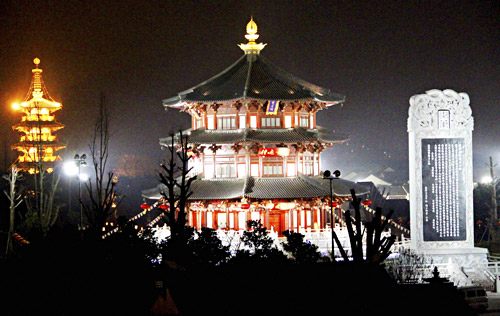|
 |
|
NEW YEAR'S GREETINGS: Jiangsu Province's Hanshan Temple rings its bell on New Year's Eve to welcome 2010 (WANG JIANZHONG) |
Thrifty Holidays
China's top discipline authorities released a circular on December 29, 2009, urging Party members and government officials to stick to a clean and thrifty professional and personal life during the New Year holidays.
According to the Communist Party of China Central Commission for Discipline Inspection and the Ministry of Supervision circular, various luxurious and lavish behaviors are "strictly forbidden," while public money and other resources should only be used to promote economic development and improve people's livelihood.
The circular urged Party members and government officials to set an example by following the Central Government's policies of administrative spending control, arrange holiday activities in a thrifty way and avoid any celebrations that have no particular reason.
Tightened Airport Security
China intensified airport security checks for flights to the United States following the thwarted Christmas day terror attack on a U.S. passenger flight, said Foreign Ministry Spokeswoman Jiang Yu on December 29, 2009.
The move was in accord with international conventions and the requirements of the U.S. Government, she told a regular press conference.
She said China had always maintained tight airport security to ensure the safety of travelers. "China is opposed to terrorism in any form, and this stance is consistent and clear," she said.
Supporting Reconstruction
The Chinese Government has allocated 20 billion yuan ($2.93 billion) from the 2010 central budget for reconstruction in earthquake-battered Sichuan, Gansu and Shaanxi provinces, the Ministry of Finance said December 28, 2009.
Sichuan will get 17 billion yuan ($2.5 billion) and Gansu will receive 2 billion yuan ($294 million). Another 1 billion yuan ($147 million) will go to Shaanxi, the statement said.
The fund will be used to finance infrastructure, environment, industry reconstruction and damage prevention and relief projects, the statement said.
China has stepped up allocation of reconstruction funds in line with the government policy to accelerate rebuilding the quake-hit region and boost domestic demand, the statement said. The 130 billion yuan ($19.1 billion) from the central budget for reconstruction this year had already been allocated, it added.
Crashing Pyramid Sales
China's Ministry of Public Security announced on December 25 it had cracked down on more than 3,000 gangs involved in pyramid sales schemes over a 100-day campaign that ended October 20, 2009.
The ministry built more than 2,200 pyramid sales cases that amounted to 7.1 billion yuan ($1.04 billion) in illegal schemes, it said in a statement.
The ministry froze or retrieved more than 1.3 billion yuan ($191 million) and destroyed more than 20,000 locations involved in the pyramid sales. More than 2,000 key members involved in the schemes were handed over to prosecutors.
Fastest Train
The Wuhan-Guangzhou high-speed railway, the world's fastest train that is designed to travel at 350 km per hour, started operation on December 26, 2009.
Two passenger trains set off from the Wuhan Railway Station and Guangzhou North Railway Station at about 9 a.m. and reached their terminals within three hours. The former service used to take 10-and-a-half hours to complete.
The service between central China's metropolitan city of Wuhan and Guangzhou, a business hub in southern Guangdong Province, began trial operations on December 9, reaching a maximum speed of 394.2 km per hour. | 